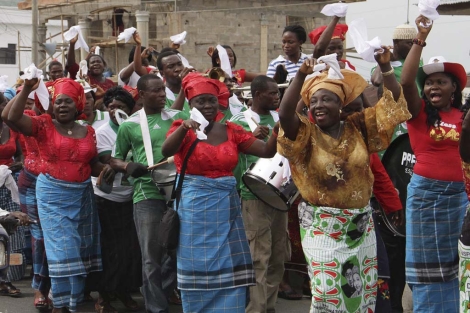Nigeria election closes his chapter with the satisfaction of having held an election for governor "peaceful" and "held in a professional manner," according to the Nigerian Electoral Commission, although the event has been marked by low turnout, fueled by voter fatigue after three electoral events in less than a month, and the theft of ballots in some states.
According to the first data began to emerge after the elections last Tuesday, the hegemonic Democratic Party (PDP) would have kept the baton in at least seven states and so maintain its power, even in the north, although there would lost at least two governors, a very powerful figure with great influence on the federated Nigeria.
The map of power begins to take shape now in the Nigerian states predicts little change in the faces that represent the local power of Africa's most populous country with 150 million inhabitants. Despite the absence of serious incidents such as those that marked the post of presidential elections held in mid April, the event was marked by the theft of ballot boxes, according to reports from organizations on the ground.
"Even though turnout was low, reports from observers indicate that the elections were well organized and held in a peaceful way in many states," said a local coalition that brings together a dozen Nigerian civil society organizations. "However, in other states has been significant reports of violence, theft of ballot boxes and other forms of electoral malpractice," he added in a statement Election Situation Room.
With elections for governor, Nigeria election caps a month in which 73 million Nigerians had the right to renew its president, legislature and leaders in 36 states. The chapter has been rated by electoral observation missions as clean and transparent, but has failed to pass the test for violence.
Around five hundred people died, mostly in northern Nigeria, in the days following the proclamation of the victory of President Goodluck Jonathan. Due to the outbreak of violence in the north, the gubernatorial elections were postponed in the states of Kaduna and Bauchi, the most affected by ethnic hatred, which celebrated today goes to the polls.
After the natural death of Nigerian President Umaru Yardua (Muslim north) in May last year, then-Vice President Jonathan-Christian native of the Niger Delta region, took power. With the comfortable victory won at the polls on April 16, Jonathan is perpetuated in power four years, a gesture that many Northerners considered an abuse of power and breach of implied covenant by which Christians and Muslims take turns power since the advent of democracy in 1999. 


According to the first data began to emerge after the elections last Tuesday, the hegemonic Democratic Party (PDP) would have kept the baton in at least seven states and so maintain its power, even in the north, although there would lost at least two governors, a very powerful figure with great influence on the federated Nigeria.
The map of power begins to take shape now in the Nigerian states predicts little change in the faces that represent the local power of Africa's most populous country with 150 million inhabitants. Despite the absence of serious incidents such as those that marked the post of presidential elections held in mid April, the event was marked by the theft of ballot boxes, according to reports from organizations on the ground.
"Even though turnout was low, reports from observers indicate that the elections were well organized and held in a peaceful way in many states," said a local coalition that brings together a dozen Nigerian civil society organizations. "However, in other states has been significant reports of violence, theft of ballot boxes and other forms of electoral malpractice," he added in a statement Election Situation Room.
With elections for governor, Nigeria election caps a month in which 73 million Nigerians had the right to renew its president, legislature and leaders in 36 states. The chapter has been rated by electoral observation missions as clean and transparent, but has failed to pass the test for violence.
Around five hundred people died, mostly in northern Nigeria, in the days following the proclamation of the victory of President Goodluck Jonathan. Due to the outbreak of violence in the north, the gubernatorial elections were postponed in the states of Kaduna and Bauchi, the most affected by ethnic hatred, which celebrated today goes to the polls.
After the natural death of Nigerian President Umaru Yardua (Muslim north) in May last year, then-Vice President Jonathan-Christian native of the Niger Delta region, took power. With the comfortable victory won at the polls on April 16, Jonathan is perpetuated in power four years, a gesture that many Northerners considered an abuse of power and breach of implied covenant by which Christians and Muslims take turns power since the advent of democracy in 1999.



- EU, US condemn electoral violence in Nigeria (26/04/2011)
- Nigeria 2-0 Mali: Flying Eagles make final of African Youth Championship (28/04/2011)
- Few people vote in northern Nigeria states (28/04/2011)
- Nigerian results trickle in after violence at polls (27/04/2011)
- El Elegido capitulo 55 Telenovela (24/04/2011)
No comments:
Post a Comment